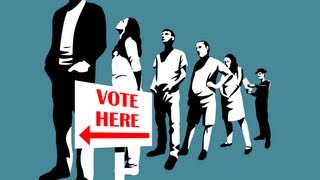(单词翻译:单击)
When the next general election rolls around,
下次美国总统大选的时候,
who will be eligible to show up at the polls and vote for the President of the United States?
谁有资格投票选举美国总统呢?
It's really pretty simple.
其实很简单。
If you are at least 18 years old, a citizen of the U.S., and a resident of a state,
如果你年满18岁,拥有美国国籍,并且是某一个州的居民,
you can vote, assuming, that is, you are not a felon. Seems about right.
你就可以在大选的时候投票啦,除非你被判了重刑。基本上就是这样。
After all, the United States prides itself on being a democracy,
毕竟美国最引以为豪的就是有一个民主体制,
or a government in which the ultimate authority lies with the citizens of the nation.
换句话说就是最终权力在人民手里的政府。
But it was not always this way.
但是美国并不是一开始就是这样的。
In 1789, George Washington won the electoral college with 100% of the vote, but whose vote was it? Probably not yours.
在1789年,乔治·华盛顿以全票当选美国总统,但是那些票是谁投的?很可能不是你我的票。
Only 6% of the entire United States population was allowed to vote at all.
当时只有6%的美国人口可以投票。
Voting was a right that only white, male property owners were allowed to exercise.
在当时只有有土地的白人男性才能行使投票权。
By the 1820s and 1830s, the American population was booming from the east coast into the western frontier.
到了19世纪20年代和19世纪30年代左右,美国人口从美国东部海岸向西部激增。
Frontier farmers were resilient, self-reliant, and mostly ineligible to vote because they did not own land.
西部的农民们都很贫穷,他们自给自足,而且绝大多数都无权投票,因为他们没有自己的土地。
As these new areas of the nation became states, they typically left out the property requirement for voting.
随着这些新开垦地区升格为州以后,才基本废除了只有拥有土地才能投票的特权。
Leaders such as Andrew Jackson, the United State's first common man President, promoted what he called universal suffrage.
一些领袖们,包括安德鲁·杰克逊,美国第一个平民总统,提倡“全民普选”制度。
Of course, by universal suffrage, Jackson really meant universal white, male suffrage.
当然杰克逊总统所指的“全民普选”其实是指全部的白人男性来参加大选。
All he emphasized was getting rid of the property requirement for voting, not expanding the vote beyond white men.
他所强调的只不过是废除只有拥有土地才能投票的规定,并没有把投票权拓展给白人男性以外的人。
By the 1850s, about 55% of the adult population was eligible to vote in the U.S., much better than 6%, but far from everybody.
到19世纪50年代左右,大约有55%的成年人可以在美国大选投票,比以往的6%大大提高,但离真正的全民普选还差得很远。
Then, in 1861, the American Civil War began largely over the issue of slavery and states' rights in the United States.
接着1861年,南北战争由于对废除奴隶制问题以及州权问题的不同主张而打响。
When it was all over, the U.S. ratified the 15th Amendment,
当战争打完的时候,美国颁布了第十五修正案,
which promised that a person's right to vote could not be denied based on race, color, or previous condition as a slave.
修正案明确了一个人的投票权利不能因为种族、肤色或者曾经为奴隶而被剥夺。
This meant that black men, newly affirmed as citizens of the U.S., would now be allowed to vote.
这代表了重新获得美国公民身份的黑人们现在可以有投票权了。
Of course, laws are far from reality.
当然,现实和法律还是差的很远的。
Despite the promise of the 15th Amendment, intimidation kept African-Americans from exercising their voting rights.
尽管有15号修正案的存在,各种威胁还是使得非裔美国人难以行使他们的投票权。

States passed laws that limited the rights of African-Americans to vote, including things like literacy tests,
各州政府通过了限制非裔美国人投票的法案,包括英文水平测试,
which were rigged so that not even literate African-Americans were allowed to pass, and poll taxes.
这些测试已被事先操纵,就连识字的非裔美国人也不能通过,还要收取投票税。
So, despite the 15th Amendment, by 1892, only about 6% of black men in Mississippi were registered to vote.
所以,虽然有15号修正案,但是在1892年大选期间,仅有约6%的在密西西比居住的黑人参与了投票。
By 1960, it was only 1%.
到了1960年,这个数字只有1%。
And, of course, women were still totally out of the national voting picture.
当然,女性还是被完全排除在外,无法投票。
It wasn't until 1920 that the women's suffrage movement won their 30-year battle,
直到1920年,长达30年的妇女普选权力运动才取得胜利,
and the 19th Amendment finally gave women the vote, well, white women.
在19号修正案上终于给予了女性投票权,准确来说,白人女性。
The restrictions on African-Americans, including African-American women, remained.
对于非裔美国人以及非裔女性的投票限制依然存在。
After World War II, many Americans began to question the state of U.S. democracy.
在第二次世界大战之后,很多美国人开始反思美国的民主体系。
How could a nation that fought for freedom and human rights abroad come home and deny suffrage based on race?
一个向世界宣传民主及自由的国家,为什么连自己国内的大选都不能做到种族平等?
The modern civil rights movement began in the 1940s with those questions in mind.
从20世纪40年代开始,那些有反思意识的人发起了关于美国国内人权的长期斗争。
After years of sacrifice, bloodshed, and pain, the United States passed the Voting Rights Act of 1965,
经过了多年的牺牲,流血和痛苦,美国终于通过了《1965年选举法案》,
finally eliminating restrictions such as literacy tests
这标志着包括英文水平测试在内的一系列限制被废除了,
and protecting the voting rights promised under the 15th Amendment to the Constitution.
并且捍卫了15号修正案里关于大选投票的规定。
Now, any citizen over the age of 21 could vote.
这之后,只要是年满21岁的公民就可以投票。
All seemed well until the United States went to war.
听上去很不错,直到美国参加了越南战争。
When the Vietnam War called up all men age 18 and over for the draft,
越南战争号召所有年满18周岁的男性都去参军,
many wondered whether it was fair to send men who couldn't vote to war.
很多人质疑将一些连选举权对没有的人送到战场是否公平。
In 1971, the 26th Amendment to the Constitution made all citizens 18 and older eligible to vote,
1971年,补充宪法的第26号修正案规定,所有年满18岁的公民都有资格投票,
the last major expansion of voting rights in the United States.
这是美国对投票权的最后一次大的修改。
Today, the pool of eligible voters in the U.S. is far broader and more inclusive than ever before in U.S. history.
今天,可以参加大选投票的人是美国有史以来人数最多、包含范围最广的。
But, of course, it's not perfect.
但是,当然,它依然还不完美。
There are still active efforts to suppress some groups from voting, and only about 60% of those who can vote do.
仍有人处心积虑地打压别人应得的投票权,可以投票的人里面也只有60%的人会投票。
Now that you know all the hard work that went into securing the right to vote, what do you think?
现在你知道了你的投票权背后的来之不易。你怎么想?
Do enough citizens have the right to vote now?
你认为现在能投票的人够多吗?
And among those who can vote, why don't more of them do it?
在可以投票的人里面,为何还是有人放弃呢?


